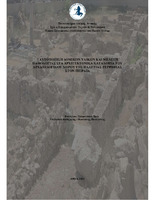| dc.contributor.advisor | Θεουλάκης, Παναγιώτης | |
| dc.contributor.author | Σμαραγδάκη, Ηρώ | |
| dc.date.accessioned | 2022-10-20T09:57:33Z | |
| dc.date.available | 2022-10-20T09:57:33Z | |
| dc.date.issued | 2022-10-19 | |
| dc.identifier.uri | https://polynoe.lib.uniwa.gr/xmlui/handle/11400/3161 | |
| dc.identifier.uri | http://dx.doi.org/10.26265/polynoe-3001 | |
| dc.description.abstract | Ο Αρχαιολογικός χώρος στην πλατεία Τερψιθέας βρίσκεται μεταξύ των οδών Καραΐσκου,
Σκουζέ, Περικλέους και Γλάδστωνος, στον Πειραιά και περιλαμβάνει τμήματα της κλασικής
και ρωμαϊκής πόλης.
Στο νότιο τμήμα του χώρου έχει αποκαλυφθεί αρχαίος δρόμος και εκατέρωθεν αυτού, τα
οικοδομικά τετράγωνα της αρχαίας πόλης, εκ των οποίων το ένα σχεδόν ολόκληρο. Στον
ανατολικό τομέα του οικοδομικού τετραγώνου και στο χώρο που καταλάμβαναν τέσσερις
οικίες κλασικών χρόνων, οικοδομείται στα ρωμαϊκά χρόνια έπαυλη, η οποία αναπτύσσεται
γύρω από μια μεγάλη περίστυλη αυλή. Η αυλή είναι στρωμένη με βοτσαλωτό δάπεδο και
περιβάλλεται από στεγασμένο διάδρομο, στο οποίο ανοίγονται πάνω από οκτώ δωμάτια.
Ο αρχαιολογικός χώρος περιλαμβάνει τοιχοποιίες πάνω στις οποίες σώζονται κατά τόπους
σπαράγματα των αυθεντικών αρχαίων επιχρισμάτων και υπόγειες δεξαμενές νερού,
κεραμικούς αγωγούς και βοτσαλωτά δάπεδα.
Στην παρούσα εργασία θα μελετηθούν οι παράγοντες φθοράς που επηρεάζουν έναν
αρχαιολογικό χώρο σε αστικό περιβάλλον που γειτνιάζει με την θάλασσα, εκτεθειμένο στις
καιρικές συνθήκες. Καθώς η διατήρηση ενός μνημείου σχετίζεται άμεσα με τα δομικά στοιχεία
από τα οποία είναι κατασκευασμένο, θα γίνει προσπάθεια ταυτοποίησης, των υλικών
κατασκευής για την συνολική μελέτη της παθολογίας των αρχιτεκτονικών καταλοίπων του
χώρου. | el |
| dc.format.extent | 164 | el |
| dc.language.iso | el | el |
| dc.publisher | Πανεπιστήμιο Δυτικής Αττικής | el |
| dc.rights | Αναφορά Δημιουργού - Μη Εμπορική Χρήση - Παρόμοια Διανομή 4.0 Διεθνές | * |
| dc.rights | Attribution-NonCommercial-NoDerivatives 4.0 Διεθνές | * |
| dc.rights.uri | http://creativecommons.org/licenses/by-nc-nd/4.0/ | * |
| dc.subject | Πειραιάς | el |
| dc.subject | Προτάσεις συντήρησης | el |
| dc.subject | Συντήρηση αρχαιολογικού χώρου | el |
| dc.title | Ταυτοποίηση των Δομικών Υλικών και Μελέτη Παθολογίας στα Αρχιτεκτονικά Κατάλοιπα του Αρχαιολογικού Χώρου της Πλατείας Τερψιθέας στον Πειραιά. | el |
| dc.title.alternative | Identification of Building Materials and Pathology Study in the Architectural Remains of the Archaeological Site of Terpsithea Square in Piraeus | el |
| dc.type | Πτυχιακή εργασία | el |
| dc.contributor.committee | Stefanis, Nikolaos-Alexios | |
| dc.contributor.committee | Λαμπρόπουλος, Βασίλειος | |
| dc.contributor.faculty | Σχολή Εφαρμοσμένων Τεχνών & Πολιτισμού | el |
| dc.contributor.department | Τμήμα Συντήρησης Αρχαιοτήτων και Έργων Τέχνης | el |
| dc.description.abstracttranslated | The archaeological site of Terpsithea Square is located between Karaiskou Street, Skouze
Street, Perikleous Street, and Gladstone Street, in Piraeus, and includes parts of the Classical
and Roman town.
In the southern part of the site, an ancient road has been revealed, and on either sides of it, the
building blocks of an ancient town have also been revealed, one of which almost in its entirety.
In the eastern section of the building block, and in the area that was occupied by four dwellings
of the Classical period, a mansion is built in the Roman period, which spans over a big
colonnaded courtyard. The courtyard is paved with pebble flooring, and is surrounded by a
sheltered corridor, to which, more than eight rooms are opened.
The archaeological site includes masonries, on which, fragments of authentic ancient coatings
and underground water tanks, ceramic pipelines, and pebble flooring survive in some places.
In this thesis, the deterioration factors will be studied, which affect an archaeological site in an
urban setting that is adjacent to the sea, and exposed to weather conditions. Since the
preservation of a monument is directly linked to the building materials that it is made of, it will
be attempted to identify the building materials towards a comprehensive study of the pathology
of the architectural ruins on site. | el |


